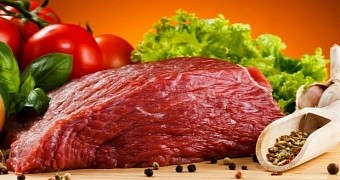Several studies carried out over the years have shown that a diet that is rich in omega-3 fatty acids, which happen to be abundant in fish, can help people stay in shape, protect their cardiovascular health, and even reduce the risk of diseases like Alzheimer's.
The problem is that, in some corners of the world, fish isn't exactly everybody's absolute favorite thing on the menu. Au contraire, folks would much rather eat other types of meat.
Hybrid meats might be the solution
Hoping to get people to embrace a healthier lifestyle, a team of scientists in China got to work creating a brand new type of meat. A few tests and experiments later, the researchers ended up producing beef that, although perfect for hamburgers, is quite similar to fish.
This laboratory-made type of beef, described in a paper recently published in Springer's science journal Biotechnology Letters, contains a great deal more omega-3 fatty acids than regular beef.
What this means is that, even if it tastes just like normal beef and is, therefore, equally delightful, this variety created in laboratory conditions packs all the health benefits that come with eating fish.
“We have provided the first evidence that it is possible to create a new breed of cattle with higher nutritional value in terms of their fatty acid composition,” study author Linsen Zan commented on the importance of this research project in a recent interview.
How does one make fish-like beef?
Writing in the journal Biotechnology Letters, scientist Linsen Zan and his colleagues explain that, to make their fish-like beef, they started by isolating a very specific gene from a nematode worm. This gene was then introduced in cattle fetal cells.
The gene in question, known to scientists as fat1, is able to convert the omega-6 fatty acids that are prevalent in beef into omega-3 oils like the ones in fish. Hence the fact that the team chose to toy with it and not some other.
Once the fat1 gene was introduced in the cattle fetal cells, the animals grew to produce five times more beneficial oils in their body than their normally would have. On the downside, neither of them lived beyond the age of 4 months.
Otherwise put, it will be a while before we make hamburgers from fish-like beef. “There is much to learn about the best scientific techniques and the best husbandry required to make beef a rich animal source of omega-3 oils for human nutrition, but we have taken the first step,” said Linsen Zan.

 14 DAY TRIAL //
14 DAY TRIAL //